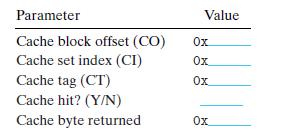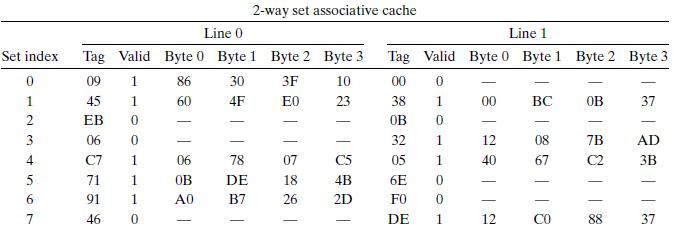Question: Suppose a program running on the machine in Problem 6.12 references the 1-byte word at address 0x0D53. Indicate the cache entry accessed and the cache
Suppose a program running on the machine in Problem 6.12 references the 1-byte word at address 0x0D53. Indicate the cache entry accessed and the cache byte value returned in hexadecimal notation. Indicate whether a cache miss occurs. If there is a cache miss, enter “—” for “Cache byte returned.”
A. Address format (1 bit per box):

B. Memory reference:

Problem 6.12
The problems that follow will help reinforce your understanding of how caches work. Assume the following:
. The memory is byte addressable.
. Memory accesses are to 1-byte words (not to 4-byte words).
. Addresses are 13 bits wide.
. The cache is two-way set associative (E = 2), with a 4-byte block size (B = 4) and eight sets (S = 8).
The contents of the cache are as follows, with all numbers given in hexadecimal notation.

The following figure shows the format of an address (1 bit per box). Indicate (by labeling the diagram) the fields that would be used to determine the following:
CO. The cache block offset
CI. The cache set index
CT. The cache tag

12 11 10 9 8 7 6 5 4 3 2 1 0
Step by Step Solution
3.48 Rating (164 Votes )
There are 3 Steps involved in it
Address 0x0D53 A Address format ... View full answer

Get step-by-step solutions from verified subject matter experts


